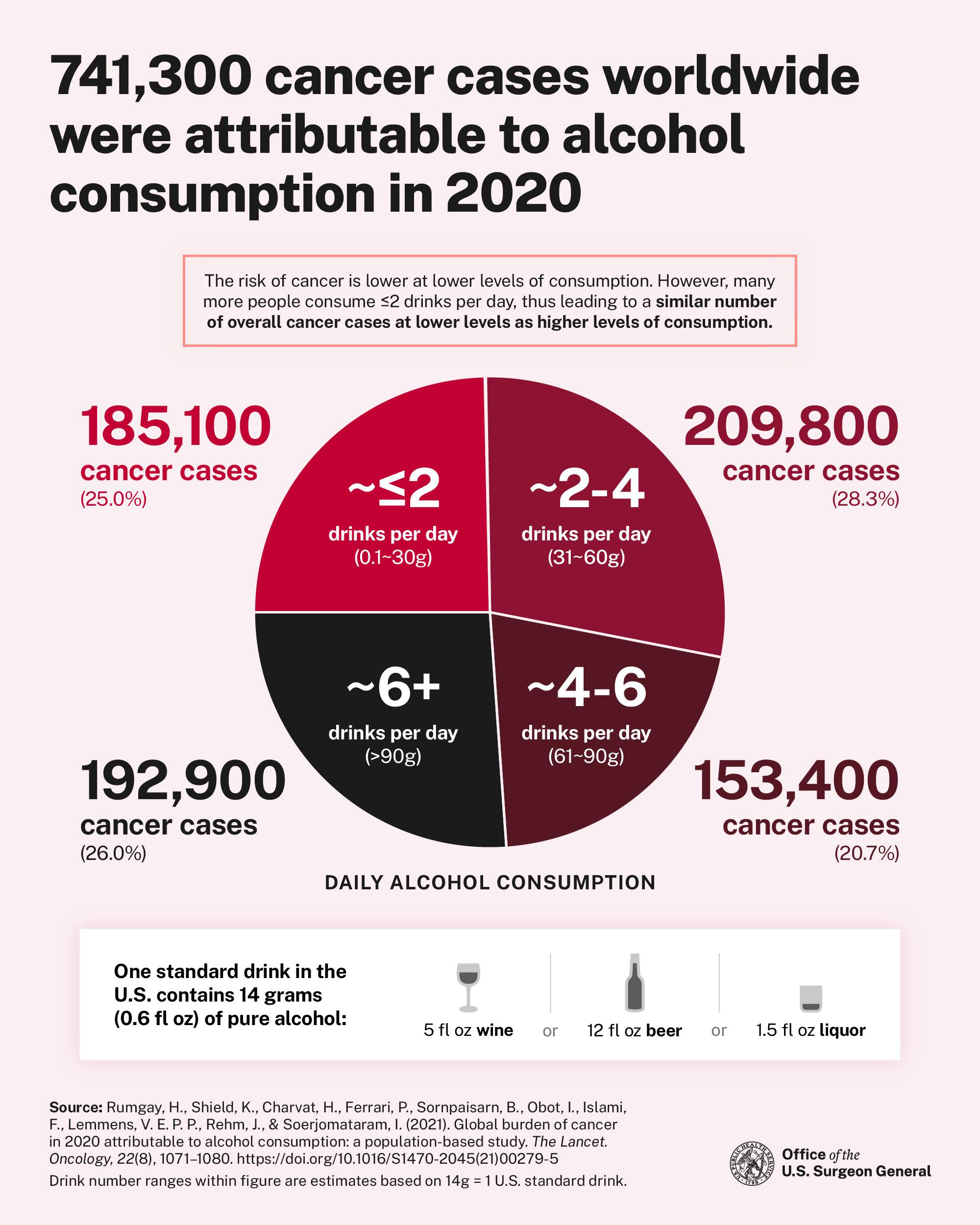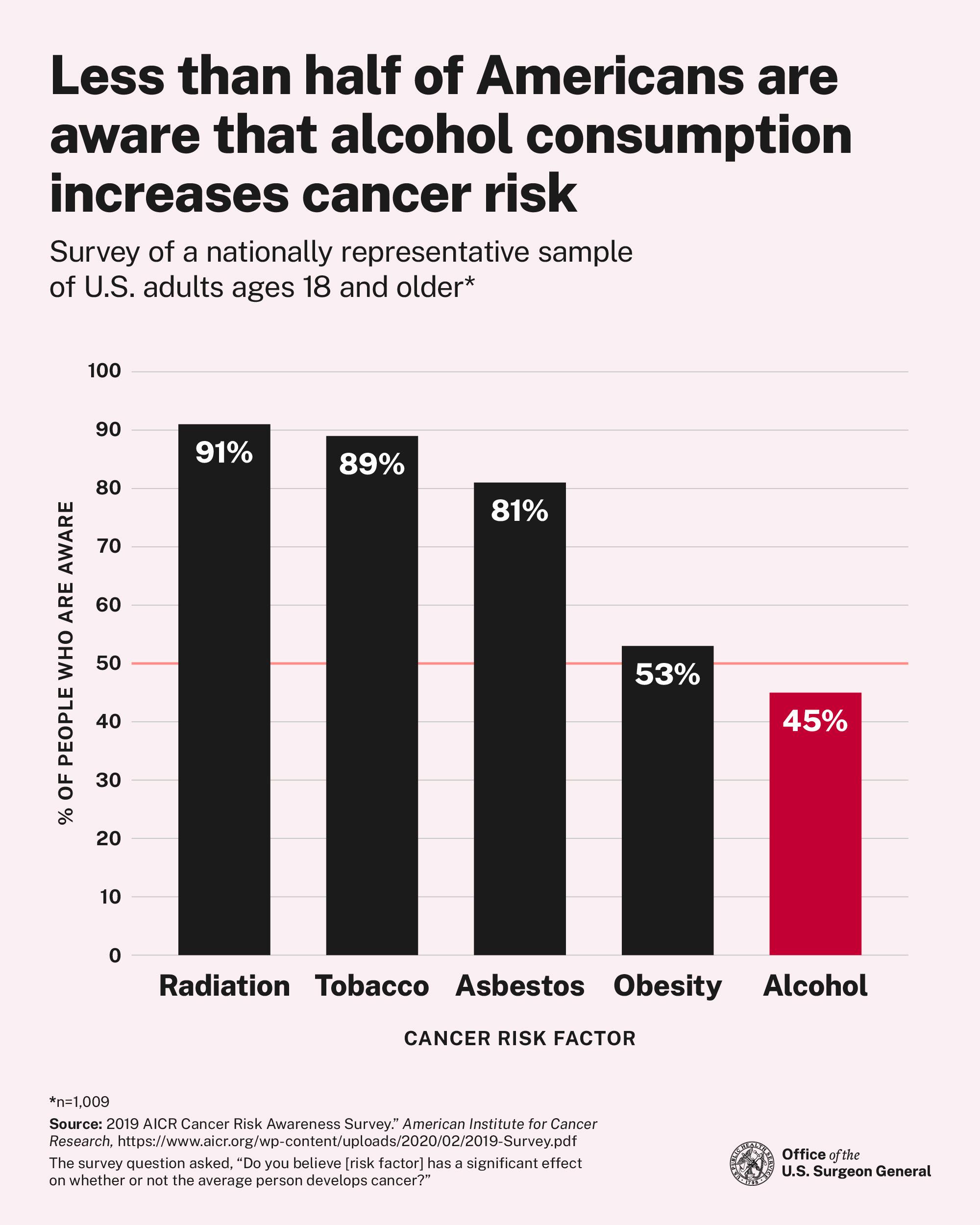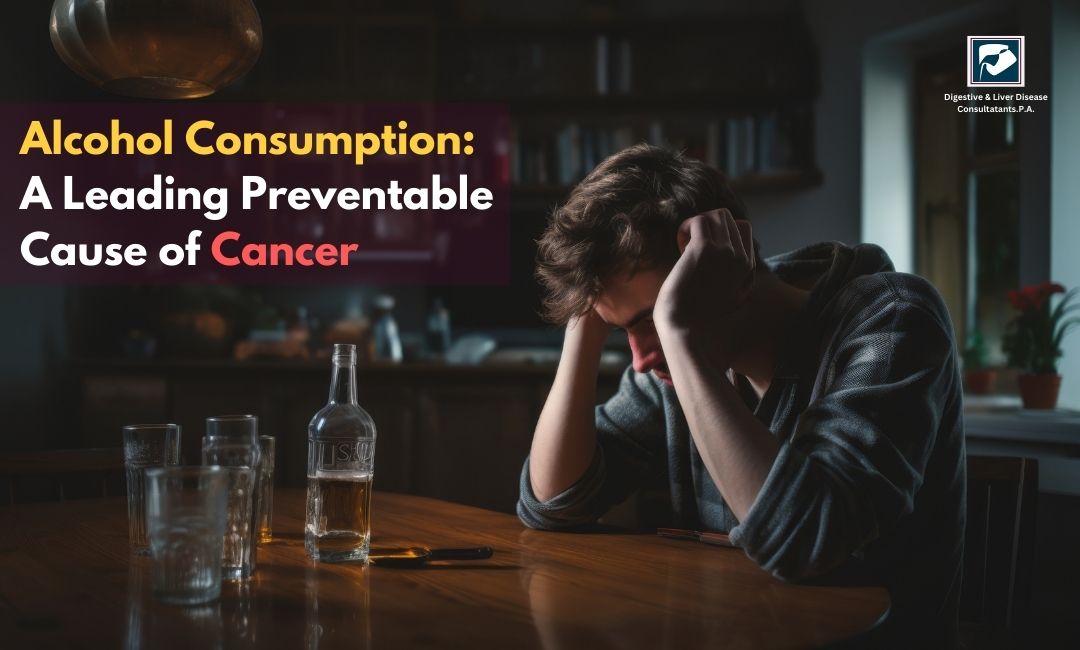Alcohol consumption is widely enjoyed and socially accepted in many cultures, but it comes with significant health risks. One of the most alarming risks linked to alcohol use is its strong association with cancer. Alcohol is the third leading preventable cause of cancer in the United States, behind tobacco use and obesity. Despite substantial evidence showing the connection between alcohol and cancer, public awareness of this risk remains disturbingly low. At Digestive & Liver Disease Consultants P.A. (DLDC), we aim to educate and empower individuals to make informed decisions about their health, with particular attention to the cancer risks associated with alcohol consumption.
A Hidden Danger: Alcohol and Cancer
Alcohol consumption is responsible for nearly 100,000 cancer cases and about 20,000 cancer deaths each year in the United States. The number of alcohol-related cancer deaths exceeds the fatalities caused by alcohol-associated traffic crashes. In fact, alcohol-related cancer deaths shorten lives by an average of 15 years, highlighting the severity of this public health issue. Despite these statistics, many people remain unaware of the direct connection between alcohol use and cancer risk. This lack of awareness is concerning, given that alcohol is a carcinogen and is linked to at least seven different types of cancer.
The link between alcohol consumption and cancer was first recognized in the late 1980s. Since then, scientific evidence has grown stronger, cementing alcohol as a known cause of cancer. Research shows that alcohol is associated with an increased risk of cancers of the liver, mouth (oral cavity), throat (pharynx), voice box (larynx), esophagus, breast (especially in women), and colorectal cancers. The more alcohol consumed, the higher the risk of developing cancer.
The Prevalence of Alcohol-Related Cancer
In the United States, alcohol consumption is responsible for a significant number of cancer cases each year. In 2019, it was estimated that 96,730 cancer cases were attributed to alcohol consumption. Of these, 42,400 occurred in men and 54,330 in women. This translates to nearly one million preventable cancer cases over the span of a decade. When we break it down further, the largest burden of alcohol-related cancer in the U.S. is breast cancer, which accounts for a substantial proportion of the total cancer cases in women.
Breast cancer alone had an estimated 44,180 cases in 2019, representing 16.4% of the 270,000 breast cancer cases diagnosed in women that year. This highlights the profound impact that alcohol consumption has on the incidence of one of the most common cancers among women. The global burden of alcohol-related cancers is equally alarming. In 2020, alcohol consumption contributed to 741,300 cancer cases worldwide, with 185,100 of these cases linked to the consumption of two drinks or fewer per day.
The Impact of Alcohol on Cancer Mortality
The effects of alcohol on cancer mortality are equally concerning. In the U.S., approximately 20,000 alcohol-related cancer deaths occur annually. To put this into perspective, this figure exceeds the number of alcohol-associated traffic fatalities in the country, which stands at about 13,500 each year. The lives lost due to alcohol-related cancer deaths are not only tragic but also cut short by an average of 15 years, resulting in the loss of around 305,000 years of potential life each year.
The types of cancer that contribute most to alcohol-related deaths differ between men and women. For women, breast cancer accounts for the majority of alcohol-related cancer deaths (about 60%). In contrast, for men, liver cancer (approximately 33%) and colorectal cancer (21%) are the leading contributors to alcohol-related cancer fatalities.
Interestingly, a substantial portion of these deaths occur at alcohol consumption levels above the recommended guidelines set by the U.S. Dietary Guidelines for Americans. These guidelines suggest a limit of two drinks daily for men and one drink daily for women. Shockingly, 83% of the 20,000 annual alcohol-related cancer deaths in the U.S. occur at consumption levels that exceed these limits. Even more concerning is the fact that 17% of these deaths occur in individuals who are consuming alcohol within the recommended limits, indicating that even moderate drinking is not without risk.

Public Awareness and Misconceptions
Despite the clear evidence of the relationship between alcohol consumption and cancer risk, public awareness of this connection remains alarmingly low. According to a 2019 survey, only 45% of Americans recognized alcohol use as a risk factor for cancer. In comparison, 91% of Americans were aware of the cancer risks associated with radiation exposure, 89% with tobacco use, 81% with asbestos exposure, and 53% with obesity. This disparity in awareness is troubling, especially considering the substantial body of research linking alcohol to cancer.
The lack of awareness surrounding alcohol as a cancer risk factor is not a new issue. Public understanding has remained relatively unchanged over the past two decades, even as scientific evidence continues to mount. This highlights a critical gap in public health education and underscores the need for increased efforts to raise awareness about the dangers of alcohol consumption and its role in cancer development.

Why Alcohol is Linked to Cancer
The connection between alcohol and cancer is complex and multifaceted. When alcohol is metabolized by the body, it produces a compound called acetaldehyde, which is a known carcinogen. This compound can damage the DNA in cells, leading to mutations that may eventually result in cancer. Additionally, alcohol can increase levels of estrogen, a hormone linked to the development of breast cancer. Alcohol also impairs the body’s ability to absorb essential nutrients, further contributing to cancer risk.
Certain types of cancer are more strongly associated with alcohol consumption than others. For example, alcohol is a well-established risk factor for cancers of the mouth, throat, esophagus, liver, breast, and colorectal region. The risk increases with the amount and frequency of alcohol consumption, with even moderate drinking being linked to a higher incidence of some cancers, particularly breast cancer in women.
Steps Toward Reducing Alcohol-Related Cancer
Addressing the issue of alcohol-related cancer requires a multifaceted approach that includes public health campaigns, policy changes, and increased education. First and foremost, there needs to be a concerted effort to raise awareness about the link between alcohol and cancer. Public health campaigns should focus on educating the public about the risks of alcohol consumption and the recommended guidelines for drinking. Efforts should also be made to reduce alcohol consumption through policies that promote healthier choices, such as restrictions on alcohol advertising, increased taxes on alcoholic beverages, and promoting alcohol-free spaces and events.
Moreover, healthcare providers play a crucial role in educating their patients about the risks associated with alcohol consumption. This can be achieved through routine screening and counseling, as well as providing resources for individuals who may be struggling with alcohol use.
The Role of Healthcare Providers
Healthcare providers, particularly those specializing in digestive and liver diseases like Digestive & Liver Disease Consultants P.A. (DLDC), play a critical role in educating patients about the risks of alcohol consumption. Physicians should incorporate alcohol consumption screening into routine checkups and provide counselling on the associated cancer risks. For patients already diagnosed with alcohol-related conditions, early intervention and education can significantly reduce the likelihood of developing cancer.
Physicians and healthcare providers can also help identify those at the highest risk for alcohol-related cancers and work with them to develop strategies for reducing alcohol intake or pursuing treatment for alcohol use disorders. By taking a proactive approach, healthcare providers can have a direct impact on reducing alcohol-related cancer cases and deaths.
Conclusion
Alcohol consumption is undeniably a leading preventable cause of cancer in the United States and worldwide. It is responsible for a significant number of cancer cases and deaths each year, yet public awareness of its role in cancer development remains alarmingly low. There is a critical need for increased education, prevention, and awareness efforts to reduce alcohol-related cancer risk. Through public health campaigns, healthcare provider intervention, and stronger policy measures, we can work to reduce the burden of alcohol-related cancers and save lives.
At Digestive & Liver Disease Consultants P.A. (DLDC), we are committed to educating our patients and the community about the risks of alcohol-related cancers and supporting efforts to reduce alcohol consumption for better health outcomes. Together, we can work toward a future with fewer alcohol-related cancer cases and a greater focus on prevention.






